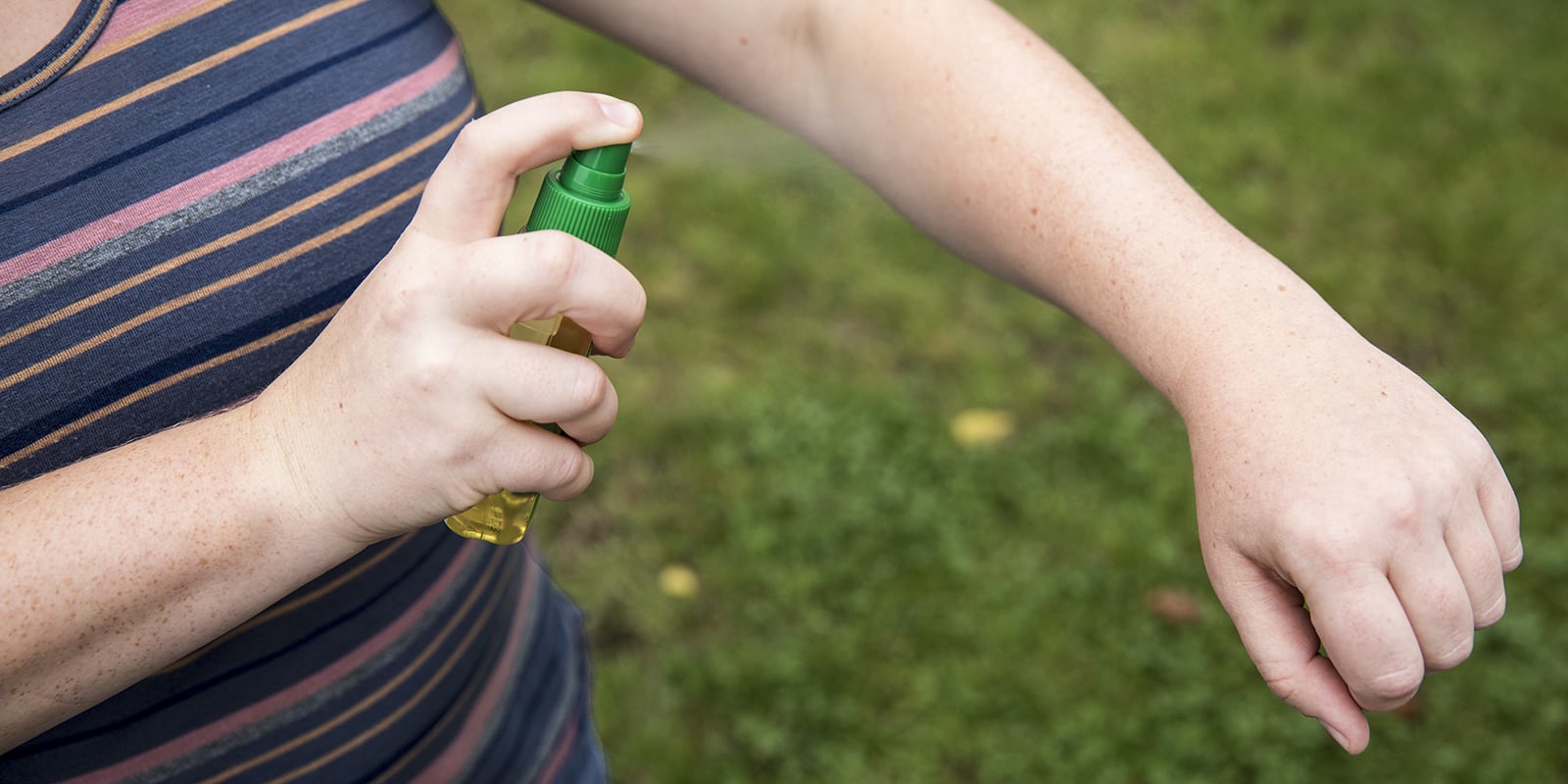
An insect repellent (also commonly called "bug spray") is a substance applied to skin, clothing, or other surfaces which discourages insects (and arthropods in general) from landing or climbing on that surface. Lyme. Powassan. West Nile. Zika. The list of insect-borne diseases to worry about seems to get longer—and scarier—every year. Whether you're enjoying the great outdoors in your own backyard or on a tropical island, when you apply insect repellent, you want the best, most effective protection from biting bugs. Some old studies suggested that the ingestion of large doses of thiamine could be effective as an oral insect repellent against mosquito bites. However, there is now conclusive evidence that thiamin has no efficacy against mosquito bites. Some claim that plants like wormwood or sagewort, lemon balm, lemon grass, lemon thyme and the mosquito plant (Pelargonium) will act against mosquitoes. However, scientists have determined that these plants are "effective" for a limited time only when the leaves are crushed and applied directly to the skin. There are several, widespread, unproven theories about mosquito control, such as the assertion that vitamin B, in particular B1 (thiamine), garlic, ultrasonic devices or incense can be used to repel or control mosquitoes. Moreover, manufacturers of "mosquito repelling" ultrasonic devices have been found to be fraudulent, and their devices were deemed "useless" according to a review of scientific studies. Some insect repellents are insecticides (bug killers), but most simply discourage insects and send them flying or crawling away. Almost any might kill at a massive dose without reprieve, but classification as an insecticide implies death even at lower doses. Synthetic repellents tend to be more effective or longer lasting than "natural" repellents. For protection against mosquito bites is recommended DEET, picaridin, oil of lemon eucalyptus (paramenthane-diol or PMD), ethyl butylacetylaminopropionate and 2-undecanone with the caveat that higher percentages of the active ingredient provide longer protection. Deet Many people assume that the more deet (N,N-diethyl-meta-toluamide) a product contains, the better. But tests found that there's no need to use higher concentrations to stay protected; products with 25 to 30 percent deet can provide long-lasting protection against mosquitoes and ticks. And some research suggests that higher concentrations and excessive doses can pose risks, including rashes and possibly even disorientation and seizures. Avoid repellents with more than 30 percent deet and not use these products (or any insect repellents) at all on babies younger than 2 months. But make sure you don't go too low: Not every product with 15 or 20 percent deet in insect repellent ratings earned a recommendation, and those with just 10 or 7 percent deet didn't work well. Picaridin This is a synthetic repellent modeled after a compound that occurs naturally in the black pepper plant. 20 percent picaridin sprays should be prefered. At least when it comes to picaridin, form seems to matter. Of two other picaridin products neither a 20 percent lotion nor a 20 percent wipe works as well as the 20 percent picaridin sprays. Finally, while picaridin is deemed safe, even for use on infants, it can irritate your skin and eyes, so you should use it carefully. Oil of Lemon Eucalyptus This is a refined version of a naturally occurring compound, extracted from the gum eucalyptus tree. It can also be produced synthetically. A product that contains 30 percent oil of lemon eucalyptus (OLE) warding off mosquitoes and ticks for at least 7 hours. OLE also appears to be relatively safe when used properly, though it can cause temporary eye injury, and the Food and Drug Administration recommends against using it on children younger than 3. OLE isn't an essential oil, and none of the products that with essential oils—including cedar, cinnamon, citronella, clove, geranium, lemongrass, rosemary, and peppermint—provided adequate protection, often failing in tests within a half-hour. IR3535 and 2-Undecanone In tests, products with these two ingredients were less effective (compared with deet, picaridin, and OLE), offering limited protection. IR3535 is a man-made compound that is structurally similar to a naturally occurring amino acid. And 2-Undecanone is a synthesized version of a compound found in rue, wild tomatoes, and several other plants. Both products appear relatively safe, but as with all repellents, they should be used with caution, especially on children. The Right Way to Apply Repellents Proper application and use is essential, both for maximum protection and to avoid possible side effects, including skin or eye irritation. That means: • Apply repellent only to exposed skin or clothing (as directed on the product label). Never put it on under clothing. • Use just enough to cover and only for as long as needed; heavier doses don’t work better and can increase risks. • Don't apply repellents over cuts, wounds, or irritated skin. When applying to your face, spray first on your hands, then rub in, avoiding your eyes and mouth, and using sparingly around ears. • Don't let young children apply. Instead, put it on your own hands, then rub it on. Limit use on children’s hands because they often put their hands in their eyes and mouths. • Don't use near food, and wash hands after application and before eating or drinking. • At the end of the day, wash treated skin with soap and water, and wash treated clothing in a separate wash before wearing again. • If you're planning to use repellents on your clothes, note that most of the ones we tested damaged leather and vinyl, and some of them stained synthetic fabrics. Regardless of which repellent product used, it is recommended to read the label before use and carefully follow directions. Usage instructions for repellents vary from country to country. Some insect repellents are not recommended for use on younger children. References: 1. https://en.wikipedia.org/wiki/Insect_repellent 2. https://www.consumerreports.org/cro/insect-repellent/buying-guide/index.htm By Mehdiyeva B.
If this page is in your subscriptions, then it will be removed. You will not see this page. If you want to unblock a user, go to the settings, the list of blocked users and click unblock